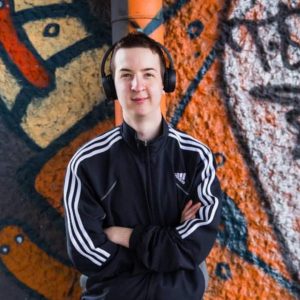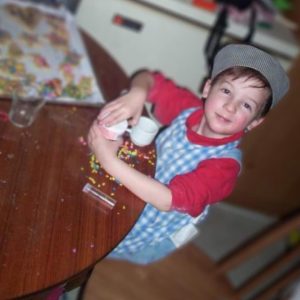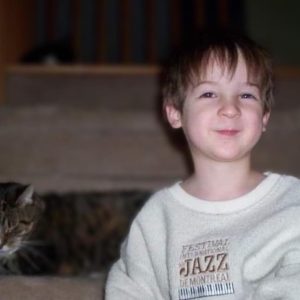By Nathalie Lizé
April reminds us of spring and nature’s renewal. April brings back the mild temperature. In April, nature is reborn and emerges from its winter slumber. April is also Autism Awareness Month. This month takes on a special meaning for me, because every day, I live with this reality. Every day I live with a 22-year-old autistic young man, my son William.
A expertise based on living
I am not an autism specialist. I am not a scientist or an expert on the subject. I am only a mother and an early childhood worker who experienced the reality of autism on a daily basis. I adapted to my son’s atypic development at the same time that the wonderful professionals who worked with my son in his early childhood were adapting. No, I don’t have a diploma in the field of autism, but I know the subject. The number of books, courses, parent training, therapy follow-ups and explanations that I have received from all these experts gives me the right to grant myself some expertise.
Autism Spectrum Disorder
Autism spectrum disorder (asd) is a neurodevelopmental disorder. Depending on the particularities of each person, the spectrum is very variable. All autistic people are different from each other and all have their own personality and strengths. There is not a single portrait or a uniform profile. It is through communications, through their social interactions and behaviors and by observing their specific activities and interests that we can recognize an autistic child.
On the website of the Quebec Autism Association, it is specified that there are 3 levels of severity.
- 1.requires support
- 2.requires significant support
- 3.requires very strong support.
There are lots of specificities and characteristics to describe autism spectrum disorder. You can find all the answers to your questions on this link which will redirect you to the Quebec Autism Association.
Playing differently
We all have in mind the image of this little one, quiet in his corner, who carefully lines up his toys and who can get very angry if this perfect line is touched, without warning. There is also the one who prefers, above all, to twirl his toys on themselves with insistence, while laughing heartily. Because, autistic people first see the world through their eyes,we can understand why the repetitive rotation of turning objects brings them so much satisfaction. Children with autism may have a strong need to be alone in a secluded place during the day. Provide a quiet corner in your preschool class. And, If you have enough space, the Natis teepee can be a perfect choice. By adding sensory toys, sets of light or even books, this peaceful space will become a shelter.
https://natis.ca/en/product/le-tipi-teepee-garderie/
We can also think about this other kid who brings to his nose all objects he holds in his hands, to discover them through the sense of smell. This child can also spend more time than necessary looking all around a toy for some unknown reason. It is also possible that he touches to understand the particularity of the textures. Children with autism use their senses to understand the world.
Very sharp senses
They often have very sharp senses. They may be more sensitive to noises, smells or even light. Some have hypersensitivity related to their particular neurological needs and it is important to provide them with soothing, soft and textured objects. At natis you can find these interesting and soothing objects. For example, the multi-textured cover for the nap which could make it easier for some of these little ones to sleep if they need to manipulate more than others.
https://natis.ca/en/product/the-multi-textures-cover-for-nap/
Or, in those moments when they can become a little more fragile, when life in a group becomes more difficult for them to bear, the multi-textures and photos album could help them calm down and by putting photos of their loved ones, the child will feel even more reassured.
https://natis.ca/en/product/the-texture-photos-album/
It is easy to understand how much the days of these little ones in their daycare represent a roller coaster of emotions and can be improving. Hats off to these children with special needs. I admire them and I know they have endless potential despite their personal challenges. They are mini super heroes!
Special interests
When my son was little, he loved tires; car, truck, motorcycle and bicycle tires. All the tires fascinated him. When we went to the farm for a tractor ride, he had to see the tires spinning. When the time came to rotate the tires in summer or winter, on our car, he was happy to notice that we had changed them. Now the tires no longer fascinate him. He grew up and developed a new special interest. He became an expert in 80s music. Why? He is the only one to know. But for sure he is an expert!
Whether it’s tires, dinosaurs, bottles, black holes, natural phenomena or any other special interest these little ones will develop, for sure, they will become experts on the subject. They will do everything to understand all its facets and they will succeed. They are fascinating and have incredible memories to store information pertaining to their particular interest. They see everywhere around them related to this interest and when they speak, the discussion often turns around this same interest. Not all children with autism will develop special interests, but those who do spend a lot of time exploring them.
Thank you
I would like to take a Little time in the last part of this text to thank the educators who take care of autistic children and support their parents. I would like to pay tribute to you who devote yourselves and adapt your interventions and your environment to accommodate these children with special needs. I would like to tell you that what you do every day helps our children grow and allows them to flourish in a world that is a little more complex for them to understand. By taking the time to try to integrate them into the group with gentleness and understanding, you open up a whole world of possibilities for them.
You are an undeniable support for parents who will receive the diagnosis of autism while their children are still in preschool, with you. Of course, you don’t always have the words, you are sometimes uncomfortable or awkward, but the most important thing is that you are listening. The most important thing is that you are there!
So on behalf of the parents and of these little ones, I say thank you! Thanks to all of you, early childhood workers; management, people who support educators in their daily tasks. My son had the chance in his early childhood to meet extraordinary people, my colleagues, who took care of him with love and patience. So to conclude, I would like to thank you my dear colleagues. You participated, a little, in your own way, in shaping part of the wonderful young man that my son has become.
See you soon
Nathalie Lizé
Pedagogical and technical support agent and family coach





